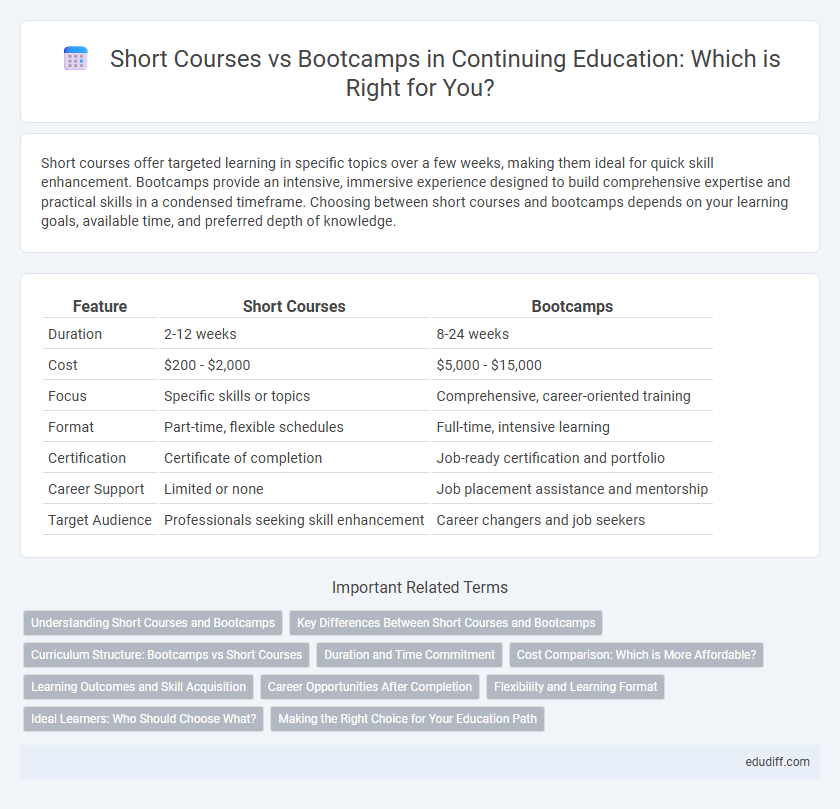Short courses offer targeted learning in specific topics over a few weeks, making them ideal for quick skill enhancement. Bootcamps provide an intensive, immersive experience designed to build comprehensive expertise and practical skills in a condensed timeframe. Choosing between short courses and bootcamps depends on your learning goals, available time, and preferred depth of knowledge.
Table of Comparison
| Feature | Short Courses | Bootcamps |
|---|---|---|
| Duration | 2-12 weeks | 8-24 weeks |
| Cost | $200 - $2,000 | $5,000 - $15,000 |
| Focus | Specific skills or topics | Comprehensive, career-oriented training |
| Format | Part-time, flexible schedules | Full-time, intensive learning |
| Certification | Certificate of completion | Job-ready certification and portfolio |
| Career Support | Limited or none | Job placement assistance and mentorship |
| Target Audience | Professionals seeking skill enhancement | Career changers and job seekers |
Understanding Short Courses and Bootcamps
Short courses and bootcamps both offer focused learning experiences but differ in duration and intensity; short courses typically last a few weeks to months, providing foundational knowledge, while bootcamps are immersive programs designed to develop practical skills rapidly within a condensed timeframe. Short courses often emphasize theoretical understanding and flexible pacing, ideal for beginners or those seeking specific topics. Bootcamps concentrate on hands-on training and real-world application, preparing learners for immediate employment in fields like coding, data science, or cybersecurity.
Key Differences Between Short Courses and Bootcamps
Short courses typically offer focused, topic-specific learning over a few weeks, catering to individuals seeking foundational knowledge or skill enhancement. Bootcamps provide intensive, immersive experiences lasting several months, designed to equip participants with job-ready skills through hands-on projects and real-world applications. The key differences lie in duration, depth of content, and career-oriented outcomes, with bootcamps emphasizing rapid skill acquisition for employment.
Curriculum Structure: Bootcamps vs Short Courses
Bootcamps offer an intensive, immersive curriculum designed to develop practical skills through hands-on projects and real-world scenarios, typically spanning 8 to 12 weeks. Short courses provide a more condensed, topic-specific curriculum aimed at foundational knowledge or skill enhancement, often lasting a few days to a couple of weeks. The bootcamp structure emphasizes comprehensive skill mastery and career readiness, while short courses focus on targeted learning objectives and flexible scheduling.
Duration and Time Commitment
Short courses typically span a few weeks with part-time schedules, allowing for flexible time commitments suitable for working professionals. Bootcamps often require full-time dedication over 8 to 12 weeks, offering an intensive, immersive learning experience. The condensed duration of bootcamps demands a higher daily time commitment compared to the extended, more manageable pace of short courses.
Cost Comparison: Which is More Affordable?
Short courses typically range from $200 to $1,000, offering a budget-friendly option for learners seeking targeted skills over a shorter period. Bootcamps, however, often cost between $7,000 and $15,000, reflecting their intensive curriculum and career services. Choosing the most affordable option depends on individual goals, time commitment, and the value placed on comprehensive training versus quick skill acquisition.
Learning Outcomes and Skill Acquisition
Short courses provide targeted knowledge and foundational skills tailored to specific topics, making them ideal for quick skill refreshers or introductory learning. Bootcamps emphasize immersive, hands-on experiences that accelerate skill acquisition and practical application, often culminating in portfolio-ready projects. Learners seeking comprehensive, job-ready competencies typically benefit more from bootcamps, while short courses suit those aiming for concise, specialized insights.
Career Opportunities After Completion
Short courses provide targeted skills that enhance resumes for immediate job roles, often suitable for entry-level positions or skill refreshment. Bootcamps offer intensive, project-based learning that aligns closely with industry demands, frequently leading to higher employability and career shifts in technology fields like software development and data science. Graduates from bootcamps typically benefit from strong employer networks and career services, resulting in faster entry into specialized roles compared to short course completers.
Flexibility and Learning Format
Short courses offer greater flexibility with self-paced learning and varied schedules, making them ideal for professionals balancing work and study. Bootcamps provide immersive, intensive formats often requiring full-time commitment, designed for rapid skill acquisition and hands-on experience. Participants seeking adaptability tend to prefer short courses, while those focused on accelerated career shifts choose bootcamps.
Ideal Learners: Who Should Choose What?
Short courses are ideal for professionals seeking targeted knowledge or skill enhancement in a specific area, offering flexibility for balancing work and study. Bootcamps suit individuals aiming for intensive, immersive learning experiences, often for career transitions into technology or coding with accelerated job readiness. Evaluating time commitment, learning style, and career goals helps determine whether a short course or bootcamp aligns better with a learner's needs.
Making the Right Choice for Your Education Path
Selecting between short courses and bootcamps hinges on your learning goals, time commitment, and budget. Short courses offer focused knowledge in specific topics with flexible schedules, ideal for skill enhancement or career exploration. Bootcamps provide immersive, intensive training with hands-on projects and mentorship, suited for rapid career transitions or in-demand tech skills acquisition.
Short Courses vs Bootcamps Infographic

 edudiff.com
edudiff.com